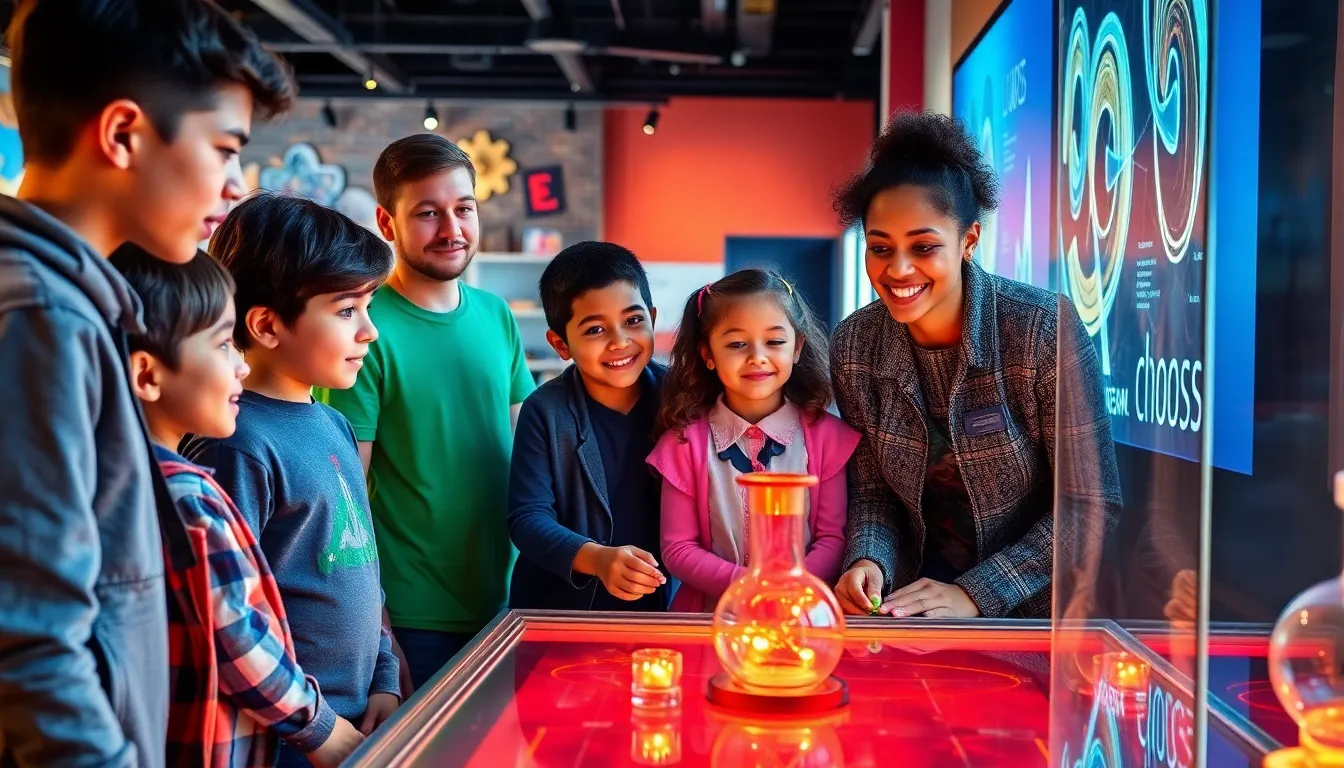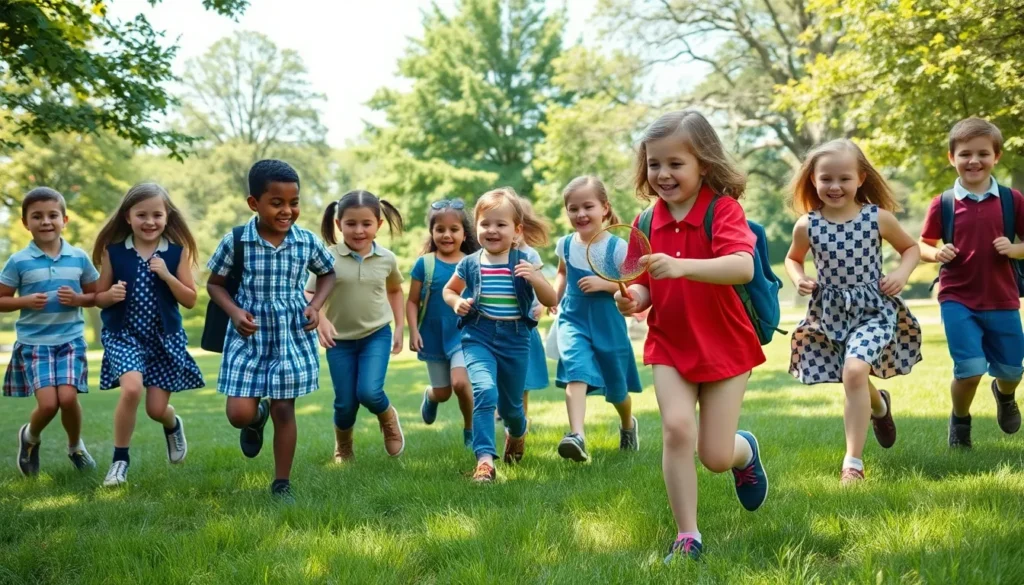Table of Contents
TogglePlanning a school field trip can feel like herding cats—exciting but chaotic. It’s not just about getting kids out of the classroom; it’s about creating unforgettable experiences that spark curiosity and learning. With the right ideas, a simple day out can turn into an adventure that students talk about for years.
Creative School Field Trip Ideas
Creative field trips enhance learning and offer enriching experiences. Here are some suggestions for unforgettable adventures.
Nature-Based Trips
Nature-based trips offer hands-on learning. Schools can plan visits to local parks or nature reserves. Students can participate in guided hikes, allowing them to explore native wildlife and plants. Organizing a trip to a botanical garden provides insight into ecosystems and environmental science. Field trips to farms enable students to learn about agriculture and sustainability. Engaging in outdoor activities, such as birdwatching or trail clean-up, fosters teamwork and respect for the environment.
Cultural Experiences
Cultural experiences broaden students’ worldviews. Visiting museums showcases regional art, history, or science exhibits. Schools can arrange a trip to historical villages to immerse students in local heritage. Scheduling performances, such as theater productions or musical concerts, introduces diverse cultures and artistic expressions. Art studios or galleries can spark creativity and inspire artistic endeavors. Encouraging visits to community festivals connects students to local traditions and celebrations. Each experience enriches their understanding of cultural diversity.
Educational Destinations

Exploring educational destinations offers unique learning experiences for students outside the classroom. These trips provide opportunities for hands-on engagement and deepen subject matter comprehension.
Science Museums
Science museums showcase interactive exhibits that spark curiosity. Students explore topics like physics, biology, and space through engaging demonstrations. Many museums offer guided tours and workshops, which enhance learning further. For example, students can participate in experiments that illustrate scientific concepts in real time. Most science museums also feature planetariums, giving students a chance to learn about astronomy in an immersive environment. By experiencing science firsthand, students develop critical thinking skills and a love for discovery.
Historical Sites
Historical sites bring the past to life and foster connections to lessons learned in the classroom. Visiting locations like battlefields, iconic landmarks, or preserved homes allows students to step into history. Guides often lead tours, sharing stories that make history relatable and exciting. For instance, students might visit a local historic village that showcases daily life in earlier times. These experiences promote understanding of cultural heritage and encourage appreciation for historical events. By interacting with history in a tangible way, students recognize its relevance to their own lives.
Adventure and Fun Trips
Engaging in adventure and fun trips can enrich school experiences. These outings spark excitement among students while promoting teamwork and exploration.
Amusement Parks
Amusement parks offer thrilling experiences with rides and attractions. Students can enjoy roller coasters, water slides, and games. These venues often include educational programs that focus on physics and engineering principles behind the rides. Participation in hands-on workshops can reinforce classroom concepts. Celebrating camaraderie, students create lasting memories while enjoying a day of fun. Many amusement parks provide discounted rates for school groups, making them accessible to a broader range of students.
Zoos and Aquariums
Zoos and aquariums provide unique opportunities to learn about wildlife and marine life. Students witness animals and their behaviors in naturalistic habitats. Many facilities offer interactive exhibits that encourage questions and exploration. Educational workshops can enhance understanding of ecology and conservation efforts. Students develop an appreciation for biodiversity and the importance of protecting endangered species. Group outings to these venues often promote teamwork and shared experiences that students cherish long after their visit.
Local Community Engagement
Engaging with the local community enriches students’ educational experiences. Schools can foster connections that extend learning beyond the classroom.
Volunteer Opportunities
Students can participate in various volunteer opportunities that enhance their understanding of community issues. Local shelters often welcome help with food drives or organization of donations. Environmental clean-up events provide hands-on learning about ecology and conservation. Nonprofit organizations frequently invite students to assist in community projects, enabling them to see the impact of their efforts firsthand. Participating in these activities develops teamwork, leadership, and a sense of responsibility. Each engagement cultivates empathy while reinforcing academic concepts in real-world contexts.
Local Businesses and Farms
Local businesses and farms offer unique learning experiences tailored to students’ interests. Schools can arrange tours that highlight farming practices and the importance of sustainable agriculture. Students gain insights into where their food comes from and how local economies operate. Many farms provide hands-on activities, like picking fruits or caring for animals, encouraging experiential learning. Collaborations with local businesses can include workshops that cover skills ranging from cooking to crafting, helping students explore future career paths. Each interaction fosters relationships that strengthen community ties and inspire a deeper appreciation for local resources.
Planning school field trips offers a unique opportunity to blend education with adventure. By choosing destinations that inspire curiosity and promote engagement, educators can create lasting memories for students. Whether exploring nature, diving into history, or enjoying local culture, each outing enhances learning in meaningful ways.
Incorporating local community resources further enriches these experiences, allowing students to connect with their surroundings and develop a sense of responsibility. Ultimately, the right field trip can ignite a passion for learning that extends far beyond the classroom, fostering teamwork and a deeper appreciation for the world around them. Embracing the possibilities of field trips ensures that students not only learn but thrive.




